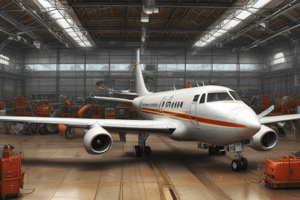Podcast
Questions and Answers
What is the primary reason why aircraft weight and balance is crucial for flight operations?
What is the primary reason why aircraft weight and balance is crucial for flight operations?
- To ensure structural integrity of the aircraft
- To improve passenger comfort
- To reduce fuel consumption
- To enhance performance and safety (correct)
What happens when an aircraft is overloaded or improperly balanced?
What happens when an aircraft is overloaded or improperly balanced?
- The aircraft's safety features are enhanced
- The aircraft becomes more fuel-efficient
- The aircraft's performance improves
- The aircraft's structural integrity is compromised (correct)
What is a key benefit of proper weight and balance in an aircraft?
What is a key benefit of proper weight and balance in an aircraft?
- Enhanced fuel efficiency and cost savings (correct)
- Increased fuel consumption
- Improved passenger comfort
- Reduced safety risks
Who is responsible for ensuring an aircraft's weight and balance are within specified limits before each flight?
Who is responsible for ensuring an aircraft's weight and balance are within specified limits before each flight?
What is the primary consequence of insufficient lift and power in an aircraft?
What is the primary consequence of insufficient lift and power in an aircraft?
What is the ultimate goal of respecting weight and balance limitations in flight operations?
What is the ultimate goal of respecting weight and balance limitations in flight operations?
What is required to ensure an aircraft's weight and balance are within specified limits before each flight?
What is required to ensure an aircraft's weight and balance are within specified limits before each flight?
What is a critical aspect of aircraft weight and balance?
What is a critical aspect of aircraft weight and balance?
What is the result of improper weight and balance in an aircraft?
What is the result of improper weight and balance in an aircraft?
What is the primary benefit of proper weight and balance in terms of the environment?
What is the primary benefit of proper weight and balance in terms of the environment?
A slight overloading of an aircraft will not significantly affect its performance.
A slight overloading of an aircraft will not significantly affect its performance.
Improper balance has no effect on the structural integrity of an aircraft.
Improper balance has no effect on the structural integrity of an aircraft.
Fuel efficiency is unaffected by the weight and balance of an aircraft.
Fuel efficiency is unaffected by the weight and balance of an aircraft.
The safety of passengers, crew, and cargo is not directly affected by an aircraft's weight and balance.
The safety of passengers, crew, and cargo is not directly affected by an aircraft's weight and balance.
Only pilots are responsible for ensuring an aircraft's weight and balance are within specified limits before each flight.
Only pilots are responsible for ensuring an aircraft's weight and balance are within specified limits before each flight.
Proper weight and balance only affect an aircraft's performance during takeoff and landing.
Proper weight and balance only affect an aircraft's performance during takeoff and landing.
Aircraft weight and balance calculations are only necessary for commercial flights.
Aircraft weight and balance calculations are only necessary for commercial flights.
Improper weight and balance can lead to fuel savings.
Improper weight and balance can lead to fuel savings.
Pilots can adjust an aircraft's weight and balance in flight if necessary.
Pilots can adjust an aircraft's weight and balance in flight if necessary.
Aircraft weight and balance are only critical during extreme weather conditions.
Aircraft weight and balance are only critical during extreme weather conditions.
How does overloading affect an aircraft's ability to generate lift?
How does overloading affect an aircraft's ability to generate lift?
What is the impact of improper balance on an aircraft's structural integrity?
What is the impact of improper balance on an aircraft's structural integrity?
How does proper weight and balance affect an aircraft's fuel consumption?
How does proper weight and balance affect an aircraft's fuel consumption?
What is the ultimate consequence of neglecting weight and balance limitations in flight operations?
What is the ultimate consequence of neglecting weight and balance limitations in flight operations?
How do pilots ensure safe weight and balance in flight operations?
How do pilots ensure safe weight and balance in flight operations?
What is the relationship between an aircraft's weight and its climb performance?
What is the relationship between an aircraft's weight and its climb performance?
How does an aircraft's weight affect its cruise performance?
How does an aircraft's weight affect its cruise performance?
What is the role of ground crew in ensuring an aircraft's weight and balance are within specified limits?
What is the role of ground crew in ensuring an aircraft's weight and balance are within specified limits?
What is the importance of accurate calculations in weight and balance management?
What is the importance of accurate calculations in weight and balance management?
How does an aircraft's weight and balance affect its overall performance?
How does an aircraft's weight and balance affect its overall performance?
Flashcards are hidden until you start studying
Study Notes
Aircraft Performance and Weight
- Aircraft performance is profoundly affected by weight, from takeoff to landing
- Heavier planes require more thrust to take off and have a slower climb rate
- Weight affects speed, fuel burn, and maximum altitude the aircraft can reach
Weight Limits and Balance Parameters
- Each aircraft has a structural weight limit, exceeding it can lead to catastrophic failure
- Weight balance is critical, incorrect balance can alter the center of gravity, affecting maneuverability and stability
- Weight limits are regulatory parameters that ensure safety and efficiency of flight
Consequences of Exceeding Weight Limitations
- Excessive weight can cause increased stress on the aircraft structure and landing gear
- In the air, it can lead to reduced climb performance, making it difficult to clear obstacles or reach a safe altitude
- Worst-case scenario, it can mean the inability to take off or control the plane
Center of Gravity and Balance
- The center of gravity is the point where the weight of the aircraft is considered to be balanced
- For safe flight, the center of gravity must fall within specific limits
- These limits are calculated and presented in the Aircraft Flight Manual
Pre-Flight Planning and Weight Management
- Critical weight-related decisions must be made during pre-flight planning
- Pilots must manage the distribution of weight to prevent the balance of the aircraft from shifting dangerously
- Computational methods are used to deduce this information accurately and decide how to distribute weight
Importance of Weight and Balance in Aviation
- Adherence to weight and balance limits is essential for stability and control, performance, structural integrity, fuel efficiency, and safety
- Weight and balance management is a dynamic process that requires constant attention
Aircraft Performance and Weight
- Aircraft performance is profoundly affected by weight, from takeoff to landing
- Heavier planes require more thrust to take off and have a slower climb rate
- Weight affects speed, fuel burn, and maximum altitude the aircraft can reach
Weight Limits and Balance Parameters
- Each aircraft has a structural weight limit, exceeding it can lead to catastrophic failure
- Weight balance is critical, incorrect balance can alter the center of gravity, affecting maneuverability and stability
- Weight limits are regulatory parameters that ensure safety and efficiency of flight
Consequences of Exceeding Weight Limitations
- Excessive weight can cause increased stress on the aircraft structure and landing gear
- In the air, it can lead to reduced climb performance, making it difficult to clear obstacles or reach a safe altitude
- Worst-case scenario, it can mean the inability to take off or control the plane
Center of Gravity and Balance
- The center of gravity is the point where the weight of the aircraft is considered to be balanced
- For safe flight, the center of gravity must fall within specific limits
- These limits are calculated and presented in the Aircraft Flight Manual
Pre-Flight Planning and Weight Management
- Critical weight-related decisions must be made during pre-flight planning
- Pilots must manage the distribution of weight to prevent the balance of the aircraft from shifting dangerously
- Computational methods are used to deduce this information accurately and decide how to distribute weight
Importance of Weight and Balance in Aviation
- Adherence to weight and balance limits is essential for stability and control, performance, structural integrity, fuel efficiency, and safety
- Weight and balance management is a dynamic process that requires constant attention
Aircraft Performance and Weight
- Aircraft performance is profoundly affected by weight, from takeoff to landing
- Heavier planes require more thrust to take off and have a slower climb rate
- Weight affects speed, fuel burn, and maximum altitude the aircraft can reach
Weight Limits and Balance Parameters
- Each aircraft has a structural weight limit, exceeding it can lead to catastrophic failure
- Weight balance is critical, incorrect balance can alter the center of gravity, affecting maneuverability and stability
- Weight limits are regulatory parameters that ensure safety and efficiency of flight
Consequences of Exceeding Weight Limitations
- Excessive weight can cause increased stress on the aircraft structure and landing gear
- In the air, it can lead to reduced climb performance, making it difficult to clear obstacles or reach a safe altitude
- Worst-case scenario, it can mean the inability to take off or control the plane
Center of Gravity and Balance
- The center of gravity is the point where the weight of the aircraft is considered to be balanced
- For safe flight, the center of gravity must fall within specific limits
- These limits are calculated and presented in the Aircraft Flight Manual
Pre-Flight Planning and Weight Management
- Critical weight-related decisions must be made during pre-flight planning
- Pilots must manage the distribution of weight to prevent the balance of the aircraft from shifting dangerously
- Computational methods are used to deduce this information accurately and decide how to distribute weight
Importance of Weight and Balance in Aviation
- Adherence to weight and balance limits is essential for stability and control, performance, structural integrity, fuel efficiency, and safety
- Weight and balance management is a dynamic process that requires constant attention
Studying That Suits You
Use AI to generate personalized quizzes and flashcards to suit your learning preferences.




